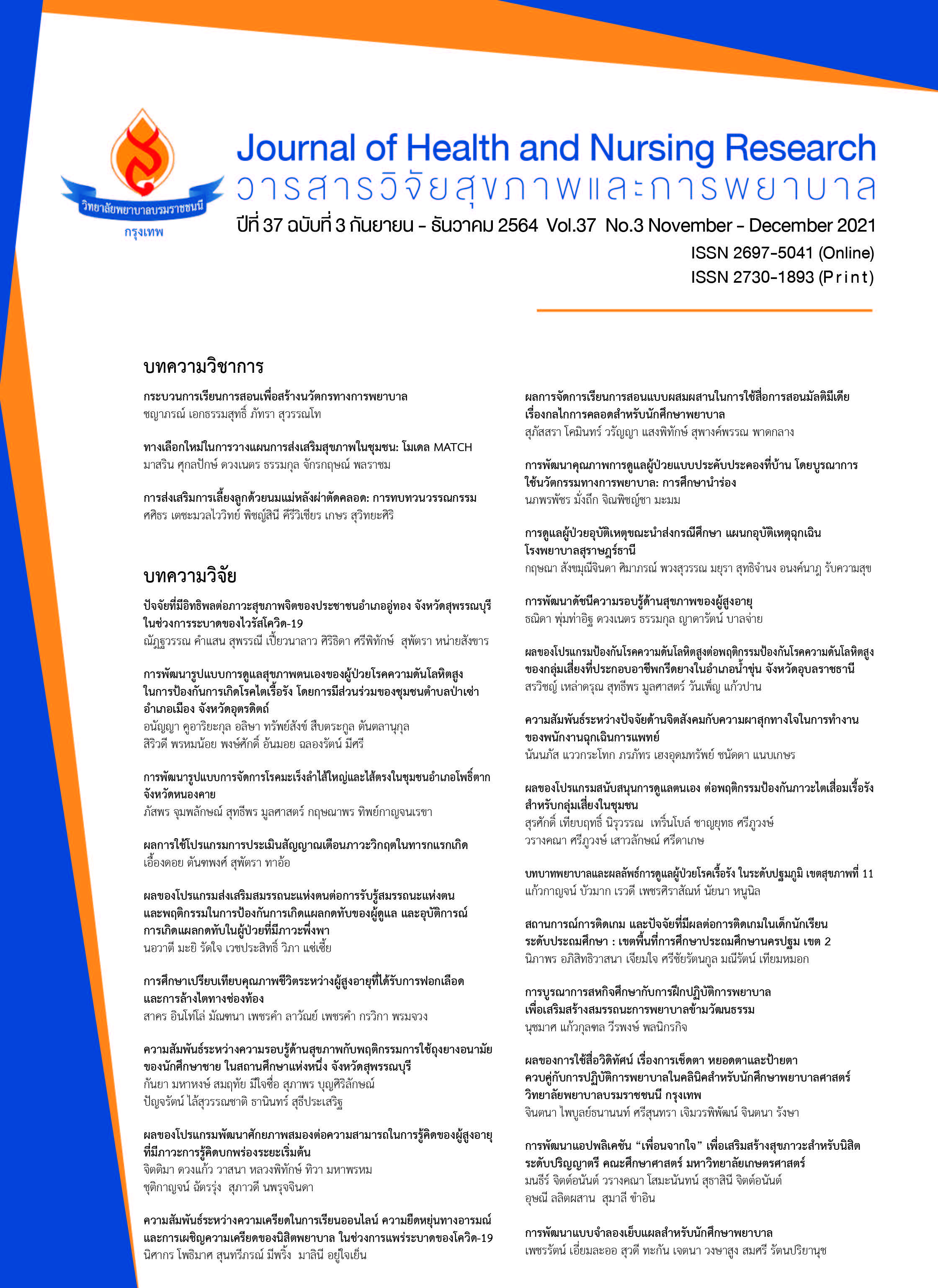ผลของโปรแกรมพัฒนาศักยภาพสมองต่อความสามารถในการรู้คิด ของผู้สูงอายุที่มีภาวะการรู้คิดบกพร่องระยะเริ่มต้น
คำสำคัญ:
ความสามารถในการรู้คิด, ภาวะการรู้คิดบกพร่องระยะเริ่มต้น, โปรแกรมพัฒนาศักยภาพสมองบทคัดย่อ
บทนำ: การจัดกิจกรรมป้องกันภาวะสมองเสื่อมเป็นบทบาทสำคัญของพยาบาลในการส่งเสริมสุขภาพสำหรับผู้สูงอายุที่มีภาวะการรู้คิดบกพร่องระยะเริ่มต้น วัตถุประสงค์การวิจัย: เพื่อศึกษาผลของโปรแกรมพัฒนาศักยภาพสมองต่อความสามารถในการรู้คิดของผู้สูงอายุที่มีภาวะการรู้คิดบกพร่องระยะเริ่มต้น ระเบียบวิธีวิจัย: วิจัยแบบกึ่งทดลอง (quasi-experimental research) ชนิดสองกลุ่มวัดซ้ำ โดยวัดก่อนการทดลอง หลังการทดลองเสร็จสิ้นทันที และติดตามผล 3 เดือน (Two group, pretest-posttest and follow-up design) เลือกกลุ่มตัวอย่างแบบเจาะจง แบ่งเป็นกลุ่มทดลองและกลุ่มควบคุม กลุ่มละ 25 คน ที่มีคุณลักษณะไม่แตกต่างกัน กลุ่มทดลองได้รับโปรแกรมพัฒนาศักยภาพสมองสร้างขึ้นตามแนวคิดกระตุ้นการรู้คิดของ Spector ประกอบด้วย กิจกรรมกระตุ้นด้านความใส่ใจ เรียนรู้และความจำ การใช้ภาษา การรับรู้เกี่ยวกับสังคมรอบตัว การรับรู้มิติสัมพันธ์ และการใช้เหตุผล เครื่องมือที่ใช้ในการวิจัย ได้แก่ โปรแกรมพัฒนาศักยภาพสมองและแบบทดสอบสมรรถภาพสมองเบื้องต้น ฉบับภาษาไทย ตรวจสอบคุณภาพเครื่องมือ วิเคราะห์ค่าดัชนีความสอดคล้อง เท่ากับ 0.76 และค่าความเชื่อมั่น เท่ากับ 0.81 เก็บรวบรวมข้อมูลโดยใช้แบบสอบถามข้อมูลทั่วไป และการทำหน้าที่ด้านการรู้คิด วิเคราะห์ข้อมูลด้วยสถิติที วิเคราะห์ความแปรปรวนแบบวัดซ้ำ และทดสอบความแตกต่างรายคู่ด้วยวิธีบรอนเฟอร์โรนี ผลการวิจัย: พบว่า คะแนนเฉลี่ยความสามารถในการรู้คิดระยะหลังการทดลองเสร็จสิ้น และระยะติด ตามผลหลังการทดลอง 3 เดือน ของกลุ่มทดลองสูงกว่ากลุ่มควบคุมอย่างมีนัยสำคัญทางสถิติที่ระดับ .05 (F1,48 = 58.62, p = < .001) โดยคะแนนเฉลี่ยความสามารถในการรู้คิดของกลุ่มทดลองในระยะหลังการทดลองเสร็จสิ้นสูงกว่าระยะก่อนการทดลอง และสูงมากขึ้นในระยะติดตามผล 3 เดือน อย่างมีนัยสำคัญทางสถิติที่ระดับ .05 สรุปผล: การศึกษาครั้งนี้สนับสนุนว่า โปรแกรมพัฒนาศักยภาพสมองช่วยเพิ่มความสามารถในการรู้คิดของผู้สูงอายุที่มีภาวะการรู้คิดบกพร่องระยะเริ่มต้น ข้อเสนอแนะในการนำผลวิจัยไปใช้: ควรนำโปรแกรมพัฒนาศักยภาพสมองไปประยุกต์ใช้ในการจัดกิจกรรมในชมรมผู้สูงอายุ โรงเรียนผู้สูงอายุ เพื่อเสริมสร้างศักยภาพในการป้องกันภาวะสมองเสื่อมในชุมชน
Downloads
เอกสารอ้างอิง
United Nations, Department of Economic and Social Affairs. World Population Ageing 2015. New York: United Nations; 2015.
Foundation of Thai Gerontology research and development institute. (2018). Situation of the Thai Elderly 2018. Bangkok: Printery;2019. p.2-10. (in Thai).
World Health Organization. Mental health and older adults [internet]. 2016 [cited 2016
November 14]. Available: http://www.who.int/mediacentre/factsheets/fs381/en/
Limsakul W, Aiemkhum B, Kongsanae P. Cognitive Stimulation with Mild Cognitive Impairment in People. Reg 11 Med J 2018;32(3):1143-54. (in Thai).
Jitapunkul S, Kunansout C, Suriya-wongpaisal W. Prevalence estimation of dementia among thai elderly: a national survey. J Med Assoc Thai 2001; 84:461-7. (in Thai).
Norlela MH, Suzana S, Hanis MY, Normah CD, Devinder KS, Mohd AO. Incidence and predictors of mild cognitive impairment (MCI) within a multi-ethnic Asian populace: a community-based longitudinal study. BMC Public Health 2019;19(1159):1-11.
Carrie DP, Leslie AP, Megan R, Tracy D, Ian B, Christina B, el at. Screening for cognitive Impairment in older adults updated evidence report and systematic review for the US preventive services task force. JAMA 2020;323(8):764-85.
Wada IK, Uemura Y, Nakashita S, Yamawaki M, Tanaka, K, Yamamoto M, et al. Prevalence of dementia and mild cognitive impairment in the Rural Island Town of Ama-cho Japan. Dement Geriatr Cogn Disord Extra 2012;2:190-9.
Mingxian G, Li G, Guihong Z, Yunming L, Shasha X, Zhao, et al. Prevalence of dementia and mild cognitive impairment in the elderly living in nursing and veteran care homes in China. J Neurol Sci 2014; 312(2):39-44.
Praison P, Chuajedton P. Factors related to mild cognitive impairments in elderly people in chiang rai province. JTNMC 2017;32(1):64-80. (in Thai).
Olazaran, J. Mild cognitive impairment and dementia in primary care: the value of medical history. Family Practice 2011;28:385-92.
Werheid K, Ziegler M, KlapperA, Kuhl PK. Awareness of memory failure and motivative training in mild cognitive impairment. Dement Geriatr Cogn Disord 2010;30(2):155 –60.
Subindee S, Sritanyarat W. Cognitive impairment in older persons with chronic illness attended at a chronic care clinic of a primary care unit khon kaen provinc. Journal of Nursing Science & Health 2014;37(1):43-50. (in Thai).
Udomittipong D, Channakorn P, Narongsak T, Chimnakboon N. Cognitive stimulation for elderly with mild cognitive impairment. Journal of Somdet Chaopraya Institute of Psychiatry 2021;15(1):62-83. (in Thai).
Tanglakmankhong K. The role of nurses in screening and caring for older adults with mild cognitive impairment in community. Journal of Health and Nursing Research 2021; 37(1):1-13. (in Thai).
Miller CA. (2009). Wellness in older adults. 5thed. Philadelphia: Lippincott Williams & Wilkins.
Institute of geriatric Medicine, Department of Medical Service, Ministry of Health. Cognitive stimulation in people with mild cognitive impairment. [Internet]. 2016 [cited 2021 Jun 16];1-112. Available from: http://203.157.212.7/ltc/document/m003.pdf.
Spector A, Thorgrimsen L, Woods B, Royan L, Davies S, Butterworth M, et al. (2003). Efficacy of an evidence-based cognitive stimulation therapy program for people with dementia: Randomized controlled trial. Br J Psychiatry 2003;183(3):248-54.
Department of older persons, Ministry of social development and human security. Order statistic [Internet]. 2020 [cited 2021 Jun 10];1-112. Available from: https://www.dop.go.th/th
Hemrungrojn S. MoCA Thai version online style. [online]. 2007 [cited 2021 Jan 15] Available from http://www.mocatest.org/wp-content/uploads/2015/tests-instruction/MoCA-Instruction-Thai.
Burns N, Grove SK. The practice of nursing research appraisal, synthesis, and generation of evidence. 6thed. Philadelphia: Elsevier Saunders; 2009.
Kwok T, Wong A, Chan G, Shiu YY, Lam KC, Young D, et al. Effectiveness of cognitive training for chinese elderly in Hong Kong. Clin Interv Aging 2013;8:213-9.
Trakulsithichoke S, Suwan A. Effects of a cognitive stimulation program on the
cognitive abilities and ability to perform the activities of daily living in elders who are at Risk of or have dementia. Thai Red Cross Nursing Journal 2016; 9(2):145-58. (in Thai).
Piyawattanapong S, Leethong-in M, Subindee S, Chotchaisthit P, Sungkaput P. Rural community perceptions of dementia in older people and its prevention. Journal of Health and Nursing Research 2021; 37(1):156-166. (in Thai).
Kansri J, Jongpanich D, teianukool N, Srinuan P, Soonthornchaiya R. The effects of brain exercise program on memory enhancement among the elderly with mild cognitive impairment. Nursing Journal of the Ministry of Public Health 2017;27(3):177-87. (in Thai).
Nakawiro D, Chansirikarn S, Srisuwan P, Aebthaisong O, Sudsakorn P, Vidhyachak C, et al. Group-Based Training of Executive Function, Attention, Memory and Visuospatial Function (Team-V) in Patients with Mild Neurocognitive Disorder. J Psychiatr Assoc Thailand 2017;62(4):337-48.
Atkinson RC, Shiffin RM. Psychology: Principles and application. 2nded. New Jersey: Prentice Hall; 1997.
Jeeraya S, Hengudomsub P, Vatanasin D, Pratoomsri W. Effects of cognitive stimulation program on perceived memory self-efficacy among older adults with mild cognitive impairment. The Journal of Faculty of Nursing Burapha University 2018;26(2):30-1. (in Thai).
ดาวน์โหลด
เผยแพร่แล้ว
รูปแบบการอ้างอิง
ฉบับ
ประเภทบทความ
สัญญาอนุญาต
บทความที่ได้รับการตีพิมพ์ เป็นลิขสิทธิ์ของวารสารวิจัยสุขภาพและการพยาบาล (วิทยาลัยพยาบาลบรมราชชนนี กรุงเทพ) ไม่สามารถนำไปตีพิมพ์ซ้ำในวารสารฉบับอื่น


















